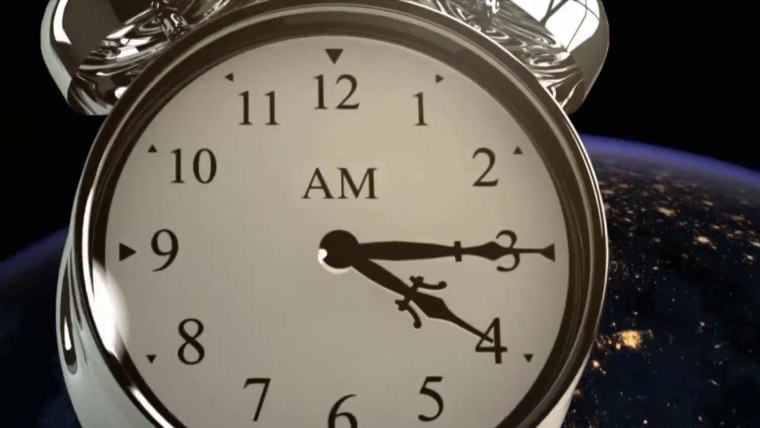In the wee hours of Sunday morning, (most) American clocks “sprung forward” due to our yearly adoption of daylight saving time; it’s likely that most of us are still adjusting to the change.
The intended result is not, however, a nation of yawning workers and schoolchildren on Monday morning, feeling as though they got up at the 6 a.m. their bodies still believe it is instead of the 7 a.m. reflected on their wailing alarm clocks. Instead, daylight saving time is designed to give us more hours of daylight in the evening when we’re all home and would ostensibly use it, which presumably makes most of us happier than a 4:30 a.m. sunrise on June 14 (the earliest sunrise of the year) would.
That’s one reason that, every year, there’s an increasingly popular push on the federal level to make “daylight saving time” the permanent time across the United States — or, rather, shift every time zone ahead one hour. Already, 15 states have passed some sort of legislation to make daylight saving time the permanent time in their state.
As someone who loves getting off work and then going out to sit in the sunlight at the end of a long day, I’m all-in on maximizing year-round the hours of light available when I’m awake and not working. So I’m generally in favor of more daylight saving time, even if it has a bit of a strange backstory.
One reason we probably are so tied to switching back and forth is the simple fact that it makes us feel in control of the one thing we absolutely cannot dictate: time.
Historically in the United States, daylight saving time started as a World War I energy- and cost-savings measure — with the added value of giving people more daylight hours during which to go shopping. (It’s a myth that the practice meets the needs of farmers during growing and harvest seasons; actual farmers tend to hate it.) Nowadays, a whole variety of special interests are on the pro-daylight-saving-time gravy train, from golf course owners (more late tee times) to candy manufacturers (more daylight hours during which to go trick-or-treating).
According to some research, it still offers some of its original benefits: A 2008 report from U.S. Department of Energy analysts showed that daylight saving time reduces electricity usage by about 0.5 percent each day. That sounds small, but it is significant across time, especially when you consider current concerns about climate change and the stability of the three major power grids in the U.S.
Other data suggests daylight saving time increases public safety, as robbery rates drop significantly every spring when the clocks are adjusted. The speculation is that criminals prefer working evenings to mornings, even though there’s an equally excellent argument to be made that once the winter chills recede in northern states, more people are outside to enjoy the weather, so crimes of opportunity decrease as a result of the increased traffic on the streets. But we do all feel safer in daylight.
Beyond that, there are apparently negative side effects of the clock switching, suggesting that despite the fact that moving every time zone ahead one hour would make for some very late sunrises in winter, we might be better off. Research suggests that the hour switch necessitated by using daylight time for two-thirds of the year and standard time for one-third of it may, as a result of the circadian rhythm disruptions, increase car accidents, increase the risk of heart problems and have long-term negative impacts on sleep habits, which can lead to other health issues.
So why are we so attached to switching the clocks? Habit? Not wanting to go to work or school in the dark? Or is it just a general human resistance to change?
As for deciding whether we can really get up and go to work in the dark if we stayed shifted ahead all winter, perhaps we should think about it differently after the past year.
One reason we probably are so tied to switching back and forth is the simple fact that it makes us feel in control of the one thing we absolutely cannot dictate: time. Think about how much you enjoy feeling like you got that extra hour of sleep, even though you know deep down that it is not true that there is an “extra” hour. Or sit, even for a moment, with the fond memories you have of staying outside until the streetlights came on, and the summer evenings when the sun setting seemed to take forever and you got to wallow in that hazy golden light instead of being driven indoors by a chill in the air as soon as the sun’s light started to fade.
Memories drive attachment for many of us, so we cling to this idea of “daylight saving” time that is relatively new and not even that popular.
I would probably be fine if we picked either daylight saving or standard time and stuck to it all year, rather than switching back and forth. While the “extra hour” is a fun mental trick to play on myself in the fall, I am always miserable for a few days in the spring as my body struggles to adjust to the shift, even though I like more sun.
But as for deciding whether we can really get up and go to work in the dark if we stayed shifted ahead all winter, perhaps we should think about it this way. After a year during which a huge proportion of us worked from home, and many parents had to find creative ways or creative hours to do so, most of us know we are not working in industries that depend on daylight being available. Be honest, how many times have you absolutely had to answer an email before sundown? Or needed sunlight instead of electric light to make a spreadsheet?
For the few people who do their work based on the position of the sun, it is not the clock that matters anyway: They work when the sun’s out (or it definitively isn’t), and the time on the clock makes no difference. The rest of us have already been on a kind of flex time for the last 12 months anyway. So if we worked flexible hours when the sun came up really late, what would it matter?
We could simply stop being obsessed with the proverbial early bird getting the worm and adopt a system of work that allows for everyone’s circadian rhythms to be respected, even if we cannot manage to make them all match. We can’t turn back time, but we can give ourselves more reasonable relationships with the clock.
Source: | This article originally belongs to Nbcnews.com












